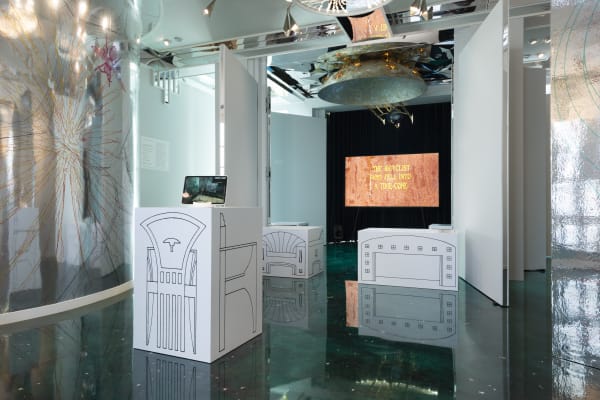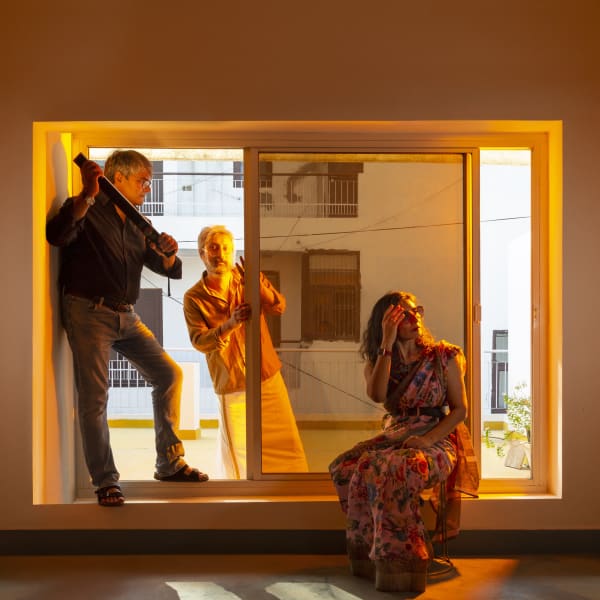-
-
This year’s Art Basel Film Programme, curated by Filipa Ramos, will feature the work of Raqs Media Collective who will be showing a new video work The Bicyclist Who Fell Into A Time Cone (2022) as well as an earlier piece Provisions for Everybody (2018). The screening will take place at Stadtkino, Basel 14 June 7pm CET.
The Bicyclist Who Fell Into A Time Cone was commissioned by the Jencks Foundation and is on display at The Cosmic House as part of a solo exhibition 1980 in Parallax until 29 December.
Raqs are also participating in the World Weather Network, a constellation of weather stations led by artists and writers around the world, as part of this project they will be in residence at The Yinka Shonibare Foundation, Ijebu, Nigeria in June, you can read more here.
Throughout May their new commission The Waves are Rising, an animated augmented reality wave on a large-scale LED screen, is on display at The Royal Docks, London as part of Sea Change curated by Invisible Dust. Read more about this commission here.
The film installation Deep Breath (2019/22) is currently on show at Everybody Talks About the Weather at Fondazione Prada, Venice until 26 November.
-

-

-
Raqs précis the film: ‘A bicyclist stood still, watching an aeroplane carrying a princeling, the then reigning Prime Minister’s son and heir, spiral down to death from the sky. The bicyclist registered a turn in time, a quickened move along a spiral. Around the same time, Ethernet was making a public appearance, out from the laboratory. Then merely a distant faint imprint of its future, as was the beginning of the HIV/AIDS epidemic, which too was snaking forward those days. How was this crepuscular time of thresholds and transience registered by the bicyclist? A time that stepped sideways into a zigzag, before rushing on again.’
For Raqs, sensing the pulse of life as it is ordinarily lived in any place resonates in response to events whose ripples may be coursing through the world at the time. Nonetheless, it still holds an awareness of all that which is not-yet-global, of that which is around it. This sensorial doubling-of being alert to things that are and are not-yet- global - is an anticipation of the way in which auditory, retinal and epidermal affects will become transformed in coming decades. Hearing will change, and seeing, and feeling. This misaligned, mis-registered apprehension of far /near and the temporal conjunction of the now/not-yet is what Raqs are conjuring as the ‘parallax’ that tiptoed its entry into our consciousness. A journey into this kind of sensory disjunction allows for the sensation of watching time simultaneously stand still and spiral, outside its habitual limits.
-
-
-
-

-
-
-

-
News
-

Raqs Media Collective
The Time it Takes at Pompidou Centre, Paris 27 Apr 2023The Time it Takes | Thursday 27 April, 7–9pm Projection and Discussion The Time it Takes will bring together four films representative of the concerns and practices of Raqs Media... -

Raqs Media Collective
1980 in parallax at The Cosmic House, London 3 Apr 2023Until 29 December 2023 1980 in parallax is an exhibition by Raqs Media Collective that centres around a new film commission, The Bicyclist Who Fell into a Time Cone –... -

Raqs Media Collective
Artist Residency at Yinka Shonibare Foundation, Ijebu, Nigeria 21 Jun 2022The World Weather Network June 21 2022–June 21 2023 We are delighted to announce the participation of Raqs Media Collective in the World Weather Network, an artistic response to the...
-






